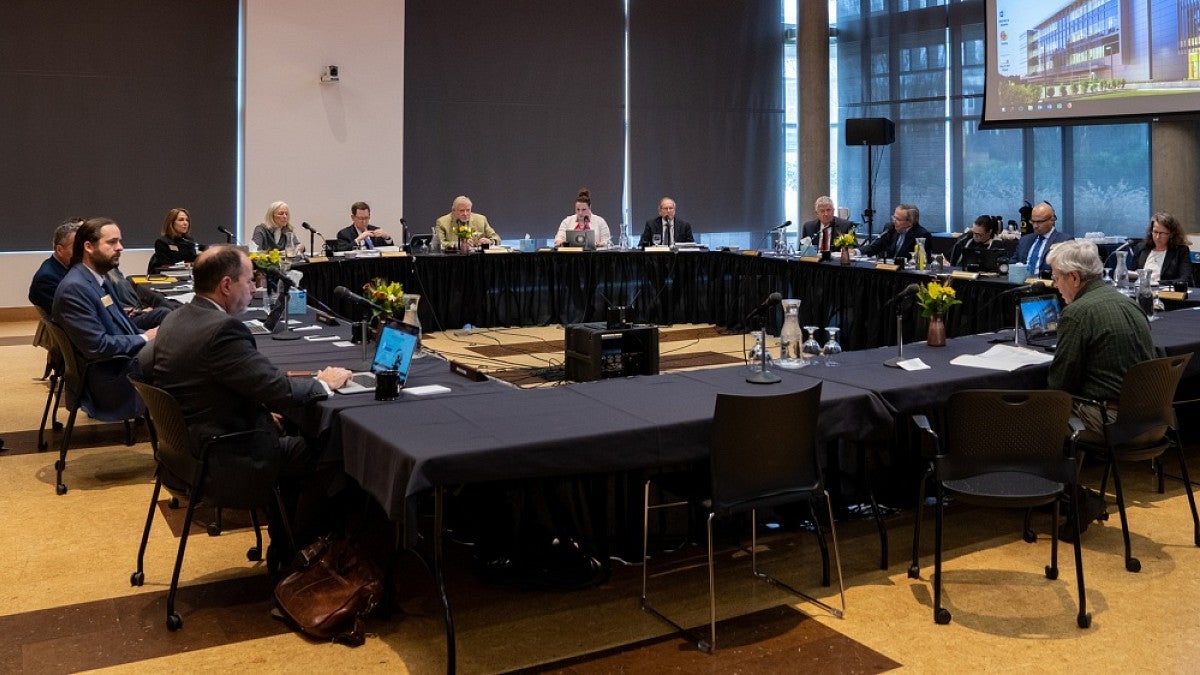The Board of Trustees of the University of Oregon worked through a robust agenda at its meeting Dec. 9-10 that included authorizing bonds for housing, approving a neuroscience degree and hearing about the tuition-setting process.
President Michael H. Schill also presented a report recognizing the university’s achievements since governance shifted from the state university system to the UO board five years ago.
“The university has experienced extraordinary improvements over the past five years,” Schill said. “We have made great progress in strengthening the university’s teaching and research excellence, in improving student success, in enhancing the experience for our students, and in promoting diversity and inclusion.”
Trustees also learned about the UO’s overall enrollment picture, recent increases in graduation rates and changes in student behavior relative to on-time graduation and how these areas are affecting the budget.
The board voted unanimously to authorize $120 million in general obligation revenue bonds, the bulk of which will fund the initial phase of an on-campus housing transformation project that the board approved at its September meeting.
The housing project is part of a capital plan and growth initiative that will enhance the student experience, aid in the recruitment and enrollment of students, and help the UO operate its facilities more efficiently.
Jamie Moffitt, vice president for finance and administration, discussed the growth initiative and its importance as the university considers ways to manage a projected funding shortfall of $10.3 million for the current academic year. The estimated shortfall is up from the $6.8 million cited at the September board meeting, which Moffitt said is due to a $4 million drop in projected tuition revenue largely caused by the boost in four-year graduation rates coupled with an additional decline in international student enrollment.
Moffitt also looked ahead to cost drivers that will affect the next academic year. Major cost drivers total $19 million, largely due to increases in faculty and staff salaries, a bump in the state’s minimum wage and rising medical benefit costs. Those factor into the tuition-setting process for early next year.
Moffitt was joined by Kevin Marbury, vice president for student life, and Roger Thompson, vice president for student services and enrollment management, to discuss the concept of a guaranteed tuition program.
According to Thompson, a guaranteed tuition program would set a fixed rate for tuition and mandatory fees, which offers students and families greater certainty in the cost of getting an undergraduate degree and increases the relative value of scholarships. The board discussed risks associated with the concept, including a scenario in which the state cut funding to the UO while tuition rates were locked. Trustees agreed, however, that a reserve fund could help mitigate the risk and that the program overall was a very appealing option that should be explored further.
The board also unanimously voted to approve a $100,000 performance bonus as part of Schill’s employment contract for meeting goals established by the trustees. Schill said he would donate $75,000 to the PathwayOregon scholarship and advising program in memory of his father, Simon Schill, who passed away in October. Schill donated his $76,000 bonus in 2018 in honor of his mother.
“My dad was unable to go to college because of the Great Depression, and he would have been pleased to know that this donation will go toward supporting a vital program that is helping open the doors of opportunity for deserving young Oregonians,” Schill said. “I am deeply grateful to the board for the trust they have placed in me as president of the University of Oregon.”
The board also amended the president’s contract to add specifics on how he might transition into a faculty position should he retire as president.
During committee meetings on Monday, Nicole Dudukovic, senior instructor of psychology, and Hal Sadofsky, divisional dean for the natural sciences, presented a new, interdisciplinary undergraduate degree proposal in neuroscience. The degree, approved by the board, will capitalize on resources already in place within the human physiology, biology and psychology programs. Once approved at the state level and by accreditors, the degree could be in place as early as next year.
In other board action, trustees reelected Chuck Lillis and Ginevra Ralph to additional three-year terms as chair and vice chair, respectively. Also, Knight Chair Ellen Peters, director of the Media Center for Science and Technology, delivered a report on evidence-based communications; Carol Gering, associate vice provost for UO Online, spoke on progress towards an online education initiative; and new University of Oregon Alumni Association Executive Director Raphe Beck gave a report.
The board of trustees’ next meeting is March 16-17, 2020.


